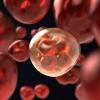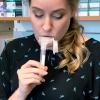Lisa Marshall
 New research suggests drugs called PARP inhibitors, designed to treat breast and ovarian cancers, work differently than previously presumed. It also shines a light on how they do work, opening the door for improved next-generation drugs.
New research suggests drugs called PARP inhibitors, designed to treat breast and ovarian cancers, work differently than previously presumed. It also shines a light on how they do work, opening the door for improved next-generation drugs. A new CU Boulder study shows that a key protein involved in learning and memory formation functions differently in males than in females.
A new CU Boulder study shows that a key protein involved in learning and memory formation functions differently in males than in females. As leaders face tough decisions about who to vaccinate against COVID-19, a new study finds that vaccinating adults 60 or older first will save the most lives in the long term.
As leaders face tough decisions about who to vaccinate against COVID-19, a new study finds that vaccinating adults 60 or older first will save the most lives in the long term. CU Boulder researchers have discovered a new compound capable of pushing past the defenses of antibiotic-resistant bacteria. It, and other recent discoveries from the lab, could lead to a new arsenal for combating the rising threat of superbugs.
CU Boulder researchers have discovered a new compound capable of pushing past the defenses of antibiotic-resistant bacteria. It, and other recent discoveries from the lab, could lead to a new arsenal for combating the rising threat of superbugs. A new neuroimaging study offers a first look at what happens in the brain when we try to stop thinking about one thing in order to make room for new ideas. The findings offer clues on how to be more productive when studying and working. They could also lead to new therapies for trauma and anxiety disorders.
A new neuroimaging study offers a first look at what happens in the brain when we try to stop thinking about one thing in order to make room for new ideas. The findings offer clues on how to be more productive when studying and working. They could also lead to new therapies for trauma and anxiety disorders. With vaccines beginning to roll out, policymakers face tough decisions on whom to bring to the front of the line. New research shows prioritizing people older than 60 will save the most lives, but prioritizing young adults works best to reduce spread. And some regions may want to ask those who've already had the virus to offer up their place in line.
With vaccines beginning to roll out, policymakers face tough decisions on whom to bring to the front of the line. New research shows prioritizing people older than 60 will save the most lives, but prioritizing young adults works best to reduce spread. And some regions may want to ask those who've already had the virus to offer up their place in line. A new mathematical modeling study by CU Boulder scientists suggests a simple scratch-and-sniff test could play an important role in screening for COVID-19. An alumnus has already invented a 50-cent test that interfaces with a smartphone app, and more research is underway.
A new mathematical modeling study by CU Boulder scientists suggests a simple scratch-and-sniff test could play an important role in screening for COVID-19. An alumnus has already invented a 50-cent test that interfaces with a smartphone app, and more research is underway. New research shows that broad, national dissemination of frequent, rapid COVID-19 tests could turn the tide on the pandemic within weeks, without shutting down schools and businesses. For curbing infection, test turnaround time is more important than test sensitivity.
New research shows that broad, national dissemination of frequent, rapid COVID-19 tests could turn the tide on the pandemic within weeks, without shutting down schools and businesses. For curbing infection, test turnaround time is more important than test sensitivity. New research shows parental restrictions have few lasting effects on a child's tech use in young adulthood. Also, college students use more tech than they ever have in their lives or ever want to again.
New research shows parental restrictions have few lasting effects on a child's tech use in young adulthood. Also, college students use more tech than they ever have in their lives or ever want to again. With results still being counted, threats of lawsuits and some suggesting it could be days or even weeks before the presidential race is resolved, election night was far from decisive. But a few things did emerge as certain.
With results still being counted, threats of lawsuits and some suggesting it could be days or even weeks before the presidential race is resolved, election night was far from decisive. But a few things did emerge as certain.


